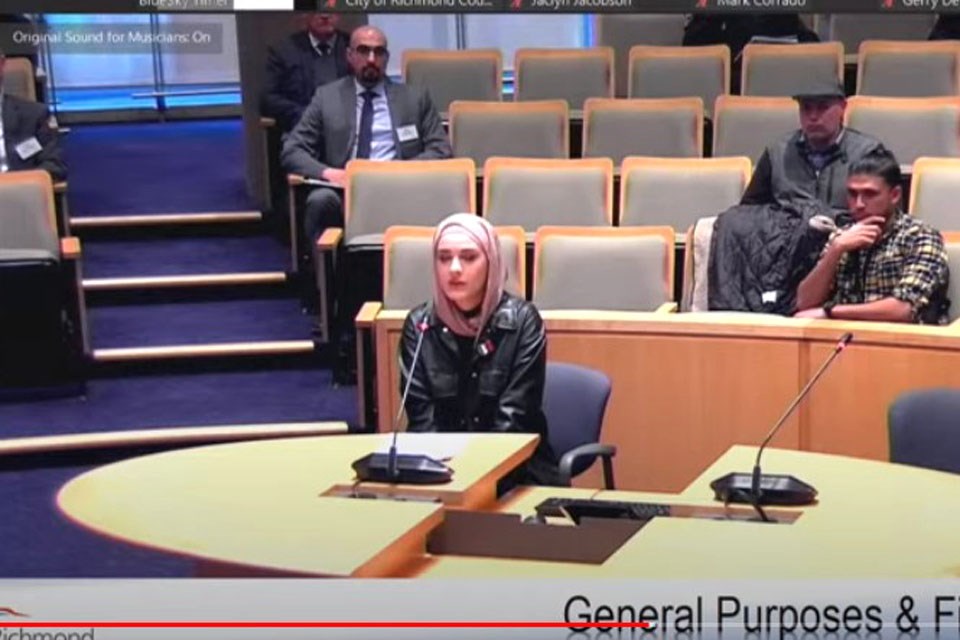Definitions of various kinds of racism and discrimination as well as a made-in-Richmond protocol on dealing with such incidents were almost unanimously supported by city council on Monday.
After Coun. Alexa Loo submitted and then subsequently withdrew a controversial definition of anti-Semitism for council’s approval in December, it was back on the agenda on Monday at a committee meeting.
This time she brought forward a broad range of definitions – used by the Government of Canada – but it still included the International Holocaust Remembrance Alliance (IHRA) definition, which is opposed by various groups.
This document includes definitions of anti-Asian and anti-Black racism, Islamophobia, colonialism and systemic and institutional racism.
Coupled with the definitions was a motion before city council to approve a “protocol,” created by various Richmond groups, that gives a step-by-step guide for individuals and organizations on how to deal with racist and hate-related incidents.
This was approved unanimously by city council.
Activist concerned about definition of anti-Semitism
When the motion to approve anti-racism definitions – which was on the agenda immediately following the protocols - was on the table, however, questions arose around whether it covers all groups and whether it stifles free speech.
An activist in the Palestinian youth movement in Richmond, Alisair Guneid, told city council she felt the motion wasn’t “comprehensive” and doesn’t cover the “anti-Palestinian movement.”
“I think this motion… doesn’t give us the freedom or mobility to criticize some movements against the Palestinian movements,” Guneid told Richmond city council.
Coun. Kash Heed asked to table the issue for a month, saying he wanted to do more research and noted Guneid’s points about anti-Palestinian racism. This was not supported by the rest of city council and it will be back next week for final approval.
In fact, both items were added to the agenda just days before the committee meeting.
Speaking to city council, Richmond resident Rahim Othman, commenting on the definitions, said trying to define anti-racism would require “infinite” definitions.
In fact, he said, many communities disagree on the definition of racism against their own group.
“There will always be opposition to a certain definition,” Othman told council. “That’s why I believe the protocol in the previous motion is the solution and not going through dry theoretical definitions that may or may not apply and send the wrong message.”
Richmond mayor Malcolm Brodie noted there are at least 80 communities – if not 800 – whose definitions of anti-racism could be included.
Loo, who brought forward the motion, said it’s a “beginning… not an end” to working against racism.
“This in no way endorses a government or regime or their policies,” Loo said. “We are not the governments or the policies of our ancestry and we shouldn’t be subject to hate or racism based on those lines of our ancestry.”
Freedom of speech guaranteed: Hobbs
Coun. Andy Hobbs, however, told the rest of council this topic of defining racism is controversial for different people for different reasons. But, while it will never be complete, he noted it has been passed by the government of Canada, which is responsible for the country’s foreign affairs.
“That carries some weight with me,” he said.
While it’s not “perfect” Hobbs added, it’s “consistent” with what city council is trying to do vis-a-vis anti-racism.
He also noted, in Canada, there are laws to protect free speech, adding “you are free to criticize anybody anywhere in any country, any government, including this council.”
“We should be clear that this, in no way, what we’re doing here today, inhibits anyone from criticizing any government anywhere around the world for anything,” he added.
The anti-racism definitions were approved by city council with only Heed voting in opposition.
The IHRA reads, “Antisemitism is a certain perception of Jews, which may be expressed as hatred toward Jews. Rhetorical and physical manifestations of antisemitism are directed toward Jewish or non-Jewish individuals and/or their property, toward Jewish community institutions and religious facilities.”
In response to a Richmond News article on council considering the definitions of anti-racism, a spokesperson of the Canadians for Justice and Peace in the Middle East, Reem Majid, said she felt the opposition to the IHRA definition was broader than just being opposed by one Jewish group, Independent Jewish Voices, mentioned in a previous News article.
This definition has, in fact, been opposed by other Jewish groups, some labour groups as well as the BC Civil Liberties Association (BCCLA).
The BCCLA warned Vancouver city council, when they were considering adopting the IHRA definition of anti-Semitism, that it was “extremely vague” and “open to misinterpretation” and would “serve to severely chill political expressions of criticism of Israel as well as support for Palestinian rights.”
Some universities and other organization have documented cases where they claim the IHRA definition caused free speech, namely, criticism of Israel, to be stifled.



